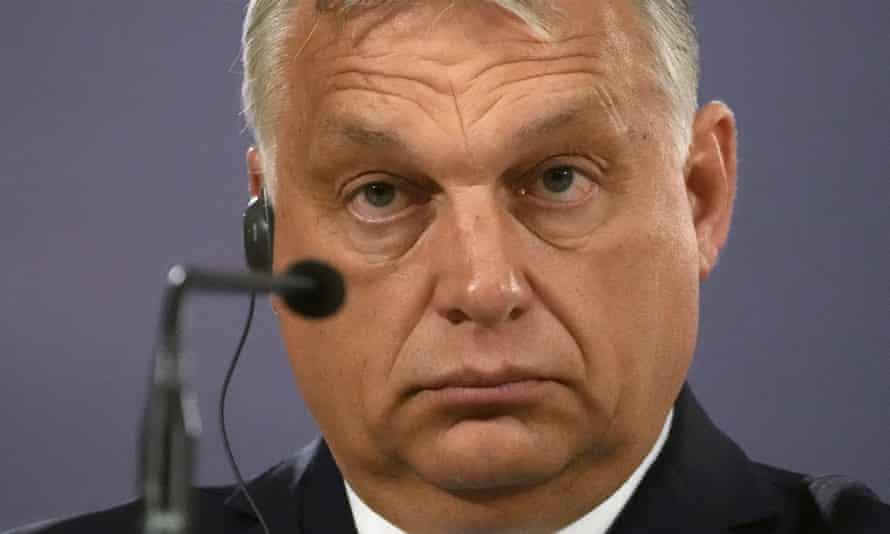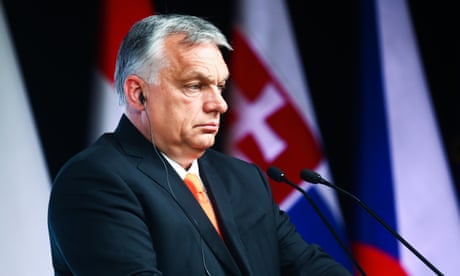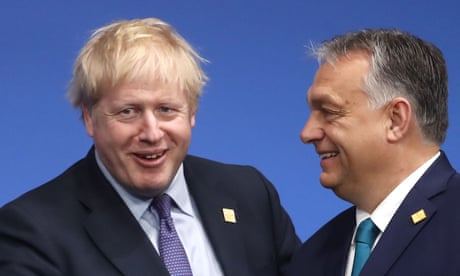EU parliament condemns Hungary’s anti-LGBT law
Resolution is passed to launch legal action, but Hungarian prime minister Viktor Orbán remains defiant

The European parliament has denounced a Hungarian law that bans gay people from appearing in educational materials or on primetime TV as “a clear breach” of its principles of equality.
In a resolution voted in Strasbourg on Thursday by a resounding majority, MEPs condemned “in the strongest possible terms” the Hungarian law as “a clear breach of the EU’s values, principles and law”, while urging the European Commission to launch a fast-track legal case against Viktor Orbán’s government.
Campaigners fear the law could lead to an increase in physical and verbal attacks on gay people in Hungary.
EU leaders rounded on Orbán in what was described as an emotional debate during last month’s EU summit, while the commission president, Ursula von der Leyen, said the law was a “disgrace”.
“This law puts homosexuality and gender reassignment on a par with pornography,” Von der Leyen told MEPs on Wednesday. “This law uses the protection of children, to which we are all committed, as an excuse to severely discriminate against people because of their sexual orientation. This law is disgraceful.”
She has promised to use the EU executive’s powers to protect citizens’ rights and sent a formal letter to the Orbán government.
Although non-binding, the resolution adds pressure on Von der Leyen to take Hungary to the European court of justice. MEPs believe the Hungarian law violates rights to non-discrimination and freedom of expression, as well as the EU’s audiovisual media services directive, pan-European rules for TV and streaming services.
Altogether, 459 MEPs voted in favour of the resolution, with 147 against and 58 abstaining.
The MEPs also say Hungarian authorities cannot be trusted to manage EU funds in “a non-discriminatory way”, amid growing calls for Brussels to turn off the money taps to Budapest.
The commission is expected to delay approval of a €7.2bn coronavirus recovery plan for Hungary, subject to further demands to tackle corruption. A looming 12 July deadline has prompted calls for Brussels to order Hungary to rewrite its plan to tackle well-documented concerns about politicised courts and weak anti-graft controls. But the commission is likely to fall short of those demands.
“The current timetable is somewhere between 16 [and] 19 July,” said the German Green MEP Daniel Freund, a member of the budgetary control committee. “They will approve the Hungarian plan. If things go well they manage to write a little bit of additional anti-corruption reforms into the plan somewhere, but nothing that addresses anything immediately.”
He continued: “My reading is that the commissions are in a pickle.” The recovery fund was “not the ideal mechanism to get countries into structural reform and rebuild their rule of law and their justice system,” he said, adding that relatively time-consuming reforms were at odds with the urgency of economic rescue after the pandemic. “These are two contradictory things.”
An EU diplomat agreed with this analysis. The commission will “probably only kick the can down the road for another week,” the diplomat said. While the commission was “troubled” by the state of judicial independence in Hungary, officials see blocking Hungary’s access to EU recovery funds over rule of law concerns as “legally complex and shaky”, the person said.
A commission spokesperson declined to confirm or deny reports of a delay. “As the in-depth assessment is ongoing, we will not provide any preliminary assessment,” they said.
Orbán, who faces elections in 2022, last week launched a nationwide poll questioning every household on the economy, migration and the EU via a series of loaded questions laden with stereotypes. In line with previous exercises, the survey and accompanying adverts demonised the Hungarian-born financier and philanthropist George Soros, linking him to “illegal migration”. One billboard slogan that has caused fresh outrage among MEPs reads: “George Soros is on the attack again?” Another asks: “Does Brussels make you angry?”
The survey cast the LGBTQ law as a child protection measure, a theme repeated by Orbán in a defiant letter to the EU this week. Accusing EU leaders of “evok[ing] the colonialist instincts of long-lost ages” and making “disrespectful power declarations”, the letter mounted a staunch defence of the law.
“We central Europeans know what it is like when the state party or the dictatorial system and the power monopoly it operates, want to raise children instead of their parents,” it said. “We did not allow it to the communists, so we will not allow these self-appointed apostles of liberal democracy to educate the children instead of Hungarian parents either.”


No comments:
Post a Comment